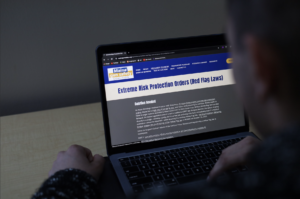On Feb. 27, Sarah Anderson, the Director of Policy at FreedomWorks, spoke to University of Maine students about criminal justice reform in America. Anderson was invited to speak by UMaine’s Young Americans for Liberty (YAL) chapter in cooperation with the UMaine College Republicans.
FreedomWorks is a group of over six million Americans that promote free markets and individual liberty. The group states that their members “all share three common traits; a desire for less government oversight, lower taxes and more economic freedom.” FreedomWorks does this by educating citizens “on important issues, or helping [people] contact [their] elected officials,” according to the organization’s website.
The organization takes stances specifically on fiscal issues, such as healthcare and education reform, but does not take sides on the majority of social issues.
One of the issues that FreedomWorks does take a position on is criminal justice reform.
“The top priority of criminal justice reform is to increase public safety, and the best way to do that is to prevent crime from happening,” Anderson said at the event.
The United States has the highest incarceration rate in the world, according to FreedomWorks’ website.
Anderson also shared that rates of reincarceration after a first offense in the U.S. are incredibly high, making criminal justice reform even more necessary. Reincarceration is known as recidivism, which is the tendency for a convicted criminal to re-offend. Anderson stated that criminal justice reform needs to occur to lower rates of recidivism, and it will only happen if citizens and politicians look carefully at America’s prison systems to determine whether or not inmates are receiving the help that they need to be able to succeed once they get out of prison.
“When inmates are coming into a prison, we [need to] look at ‘What got you here? What is the situation at home? Are there reasons that you weren’t able to be successful in society without committing a crime – whether it is lack of education, inability to find a job, or lack of literacy?’ What can we do while someone is incarcerated to help them get the skills they will need to succeed on the back-end?” Anderson said. “Whether it is drug treatment, mental health treatment, education, or vocational skills [we need to] allow non-profits and industries to come into prisons and offer those without any cost to the taxpayers to create people [who come out] and are able to participate in society.”
One example of this is America’s war on drugs. Anderson stated that America’s war on drugs has taken over prisons and that oftentimes people are incarcerated for far too long for their non-violent crimes
“I don’t think there are many people out there that don’t think that there should be some level of punishment for a proven crime, but oftentimes the crime does not fit the punishment,” Anderson noted.
Anderson presented the fact that within the judiciary and the criminal justice system, there isn’t a distinction made between drug users, dealers and traffickers, resulting in jails holding these people for decades, leaving people to come out feeling hopeless. She argued that the prison system should be getting these people the help they need for their potential addiction problems, so they can come out of jail ready to make healthy choices.
FreedomWorks is passionate about this issue, as they believe it will create opportunities for those in jail to become more productive members of society once they leave, but also because of the cost taxpayers pay to keep someone in jail. Anderson says that it costs approximately $36,000 in taxpayer money per inmate to hold a person in jail for a year, according to the federal average.
Anderson shared that recidivism rates are incredibly high in the U.S. because there is a huge stigma surrounding people with a criminal record when they go back into society, even if they were able to get the help they needed in jail.
“Ban the Box” is a political campaign that argues that hiring applications should remove the box asking whether or not an applicant has a criminal record. This campaign believes that a conditional offer should be made to an applicant before the hiring personnel are able to ask if the applicant has a criminal record. In turn, this is thought to avoid the instant rejection that many people with a criminal record get when they try to apply for jobs. This kind of law has been passed in a number of states.
Pennsylvania has sought to reduce recidivism and welcome people back into society by emplacing a Clean Slate Act. This act allows some criminals records, for crimes that are non-violent and misdemeanors that meet certain standards, to be sealed. In turn, these people will be given a better shot at obtaining jobs and licenses that they might not otherwise qualify for with their criminal record.
In 2019, President Trump signed the First Step Act that intends to reduce recidivism, among other things.
“The First Step Act is providing prisoners with a second chance through rehabilitative programs, fair sentencing, and smart confinement,” according to the White House’s website. This act was seen as monumental, for both Republicans and Democrats, as is it thought to be the first step towards criminal justice reform in America.
For more information about FreedomWorks visit www.freedomworks.org.












